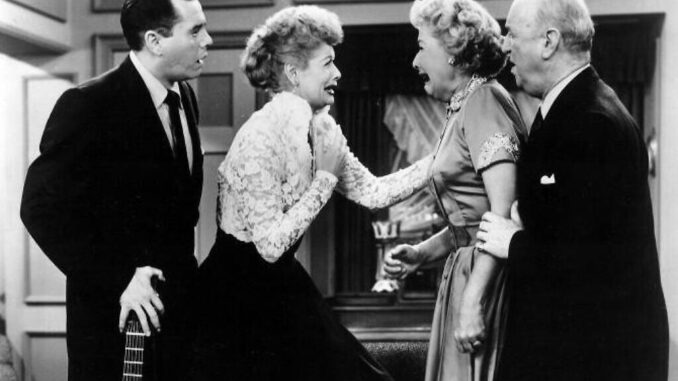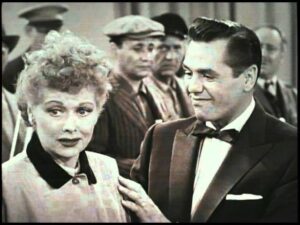
Introduction: A Comedy That Broke Boundaries
‘I Love Lucy’ is remembered for its iconic humor, Lucy and Ricky’s antics, and its groundbreaking portrayal of a multicultural marriage. But beneath the laughter, the show occasionally ventured into serious territory. One such moment occurred when it tackled antisemitism—a daring move for a sitcom in the 1950s. This pivotal episode not only entertained but also educated, proving that even comedy could spark conversations about prejudice.
Why Antisemitism Was a Bold Topic in the 1950s
The Cultural Climate of Post-War America
In the wake of World War II, America was grappling with the horrors of the Holocaust. Yet, antisemitism still lingered in many parts of society. Addressing this issue on a light-hearted sitcom was practically unheard of.
Television’s Role in Shaping Society
During the 1950s, TV was becoming a dominant medium for entertainment and education. Shows like I Love Lucy had a unique platform to influence public opinion, making their decision to address antisemitism both risky and impactful.
The Episode That Took a Stand
A Synopsis of the Storyline
In the episode, Lucy Ricardo unwittingly insults a guest by repeating a prejudiced remark she heard. When confronted, Lucy is horrified and works to make amends. The storyline weaves humor with a strong moral lesson about the dangers of perpetuating stereotypes.
The Impactful Confrontation Scene
The turning point comes when the insulted character explains how such remarks contribute to broader discrimination. This heartfelt moment resonates with both Lucy and the audience, emphasizing the power of words.
Lucille Ball’s Vision for Social Commentary
Why Lucille Ball Was More Than a Comedian
Lucille Ball wasn’t just a comedic genius; she was also a trailblazer who understood the potential of television to address serious issues subtly.
Collaboration With Writers
Ball worked closely with the show’s writers to ensure the episode balanced humor and a meaningful message, making it palatable for a mainstream audience.

The Risks of Addressing Antisemitism
Network Concerns
The network initially hesitated, fearing backlash from advertisers and viewers. Antisemitism was a controversial topic, and addressing it could alienate some of the audience.
Public Reception
Despite these concerns, the episode was well-received. It opened the door for other shows to explore social issues, proving that audiences were ready for meaningful content.
The Role of Comedy in Tackling Prejudice
Laughter as a Bridge
Comedy has a unique way of disarming audiences, making them more receptive to serious messages. By wrapping the lesson in humor, I Love Lucy ensured its message reached millions without feeling preachy.
Other Examples of Social Commentary in Sitcoms
This episode set a precedent for later shows like All in the Family and The Jeffersons, which used humor to address racism, sexism, and other societal issues.
The Legacy of the Episode
How It Influenced Future Television
This bold move by I Love Lucy paved the way for more socially conscious storytelling in television, proving that sitcoms could be both entertaining and thought-provoking.
The Enduring Message
Decades later, the episode remains a reminder of the importance of challenging prejudice, even in unexpected places like a comedy show.
Behind the Scenes: Making the Episode Happen
The Writers’ Perspective
The writers faced a delicate balancing act, crafting dialogue that was both impactful and in line with the show’s comedic tone.
The Cast’s Reaction
The cast, including Desi Arnaz and Vivian Vance, supported the episode’s message, understanding its importance in promoting tolerance.
Why This Episode Still Matters Today
Relevance in Modern Times
Prejudice hasn’t disappeared, and the episode’s message is as relevant today as it was in the 1950s. It serves as a timeless reminder of the power of media to challenge hate.
A Lesson for Modern Creators
Modern TV writers and producers can take inspiration from I Love Lucy’s courage, using their platforms to address pressing social issues.
Conclusion: A Bold Step Forward
‘I Love Lucy’ wasn’t just a sitcom; it was a cultural phenomenon that dared to tackle serious issues like antisemitism. This episode showed that comedy could be a powerful tool for social change, leaving a legacy that continues to inspire. By confronting prejudice head-on, Lucille Ball and her team proved that laughter truly is universal—and that it can be a force for good.
FAQs
1. Which episode of ‘I Love Lucy’ addressed antisemitism?
The episode doesn’t explicitly label itself as addressing antisemitism but features a storyline where Lucy confronts the consequences of repeating a prejudiced remark.
2. Was there backlash to the episode?
While the network was initially hesitant, the episode was largely well-received by audiences and critics alike.
3. How did Lucille Ball approach social issues in the show?
Lucille Ball believed in using comedy to subtly address important topics, blending humor with meaningful lessons.
4. Did other episodes of ‘I Love Lucy’ tackle social issues?
While most episodes focused on humor, a few, like this one, included subtle social commentary.
5. Why is this episode significant in television history?
It was one of the earliest examples of a sitcom addressing a serious social issue, paving the way for more socially conscious storytelling in TV.